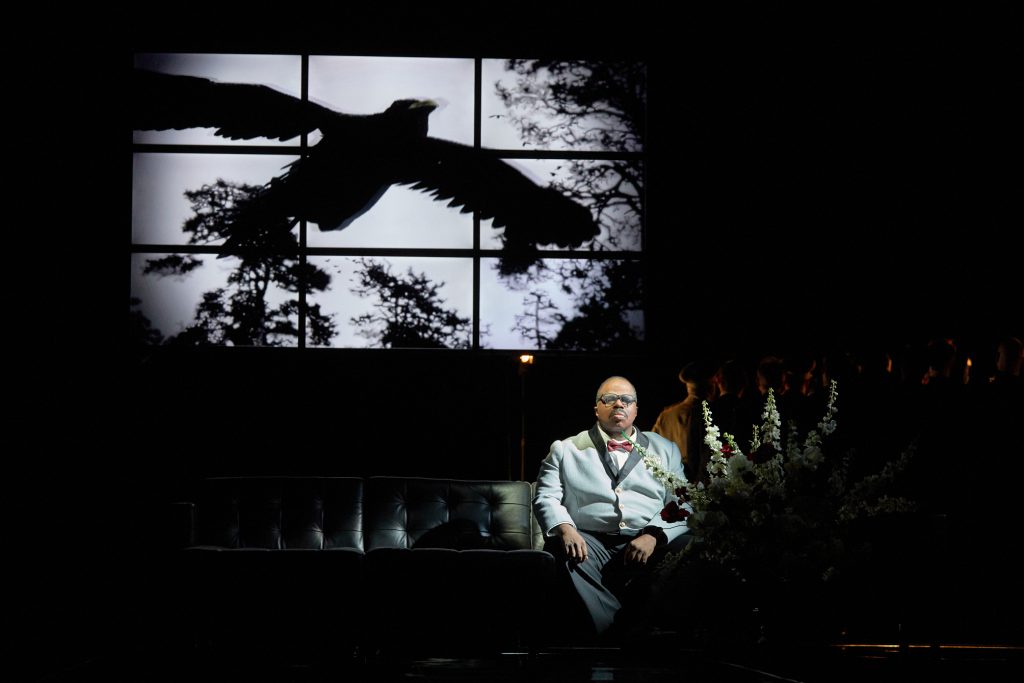By Philippa Kiraly, Special to the Sybaritic Singer
“…a scenario where the obscene wealth, the corruption of high political power, and the moral voice of the court all vibrate with an undercurrent of fear, violence, misogyny…” Sound familiar? This is actually a description by director Lindy Hume of Giuseppe Verdi’s opera Rigoletto, which she is currently staging at Seattle Opera and has set in modern times.
Verdi and Victor Hugo, from whose play Le roi s’amuse the libretto is taken, created a dark tale where villainy wins and virtue dies, to the displeasure of the Austrian censors of the time who only accepted the opera after the villain was changed to an Italian duke. It is, unfortunately, a tale the relevance of which is starkly clear today as much as in any period where the opera is set, or since. It is impossible not to make comparisons while at the same time hearing Verdi’s glorious music, sung exceedingly well, in an imaginatively designed production.
Briefly, the tale is of a libertine duke, abetted by his sycophantic retinue and his jester, Rigoletto, who makes cruel, malicious, pointed comments. The duke, busy seducing one courtier’s wife, is cursed along with Rigoletto by another courtier whose daughter the duke has ruined. The courtiers discover and kidnap Rigoletto’s sheltered teenage daughter Gilda, who has given her heart to the duke she saw at church, thinking he is a poor student. They take her to court, where she is ravaged. Rigoletto is taunted by the courtiers, grabs Gilda and vows vengeance. It’s a telling moment when she rushes on stage clad only in a man’s dress shirt, undone. Rigoletto plans to have the duke murdered by assassin Sparafucile, but all goes wrong, and it’s his daughter who is murdered instead, to Rigoletto’s horror and despair.

Lester Lynch returns to Seattle Opera as the title character in Rigoletto | Philip Newton photo
The singing in this production is excellent and expressive across the board, as is the acting. The Duke of Mantua, young, personable, charming, and full of himself, his power, and his love’em and leave’em style, was sung opening night by tenor Liparit Avetisyan in his Seattle Opera debut. Baritone Lester Lynch sang the hunchback Rigoletto in the performance of a lifetime: his horrible job, his self-loathing, his redeeming love for his daughter, his anger, his fear, his anguish, come through in turns every moment he is on stage. Soprano Madison Leonard, also a Seattle Opera debut, made a completely believable teenager, a loving daughter with budding hormones but chafing at her overprotective father somewhat, shy, ready to flower, and too innocent to understand what the duke is up to.
Verdi highlights these three roles, while others are much smaller, but all were well performed here, as were such scene setters as the servants: the photographer, the secretary, the maid, the dresser, all female.
The set, by product designer Richard Roberts, and lighting, by Jason Morphett, contributed much. Roberts caused the duke’s reception room to occupy the whole stage, and when the scene was elsewhere, this room’s walls and doors were never banished, merely lifted halfway up above the stage, adding a looming presence throughout.
Below was a turntable where scenes with much smaller sets moved as the action warranted: the 50’s style kitchen of Rigoletto’s home, his daughter’s virginal narrow bed, the sleazy bar where Sparafucile (bass Ante Jerkunica) hangs out behind the counter where his seductively clad sister Maddalena (mezzo-soprano Emily Fons) comes on, pretty graphically, to the not-at-all averse duke who is out slumming.
The garbage cans behind are where Rigoletto makes Gilda listen to the duke’s words, the same words that he said to her, and the place where her body is dumped after Maddalena persuades her brother to murder her rather than the duke because she, like so many others, fell under his spell.
It’s a riveting scenario, the orchestra under veteran conductor Carlo Montanaro supporting and creating the scene for the ears as superbly as the stage action is accomplished. Morphett’s well-chosen lighting often uses spotlights with a softer- or dimly-lit background.
Quibbles include some effects laid on with too much of a heavy hand. The windows in the duke’s reception room feature bushes and a flock of birds, but at tense moments, one or more crows, much larger and closer fly past. Very effective once or twice, but it happened too often.
These windows then became video mosaics which with constant movement distracted from the actors and singers. Later they became mirrors, which in the shadowy world behind and beside the small turntable sets reflected part of the action just enough to distract, again.
The use of strobe lights with the lightning in the music came too often, necessitating closing eyes to the action when they became too much.
Nevertheless, this is a memorable production. The run continues through August 28.
If You Go
- Aug. 10, 11, 14, 17, 18, 23, 24, 25, & 28, 2019
- In Italian with English Subtitles | at McCaw Hall
- Performance Time: 2 hours and 30 minutes including 1 intermission
- Rigoletto contains mature themes including violence and sexuality.
- Best pricing and availability: Sunday, August 18; Saturday, August 24; and Sunday, August 25
- Main floor seats start at $69
 Philippa Kiraly has writing classical music criticism since 1980, for several newspapers in northern Ohio and Seattle, magazines, both local and national, and blogs. She is passionate about the importance of independent criticism for the fine arts, an art in itself which is dying with little interest by many publications and no longer a viable career for most. But writing for tickets is always worthwhile!
Philippa Kiraly has writing classical music criticism since 1980, for several newspapers in northern Ohio and Seattle, magazines, both local and national, and blogs. She is passionate about the importance of independent criticism for the fine arts, an art in itself which is dying with little interest by many publications and no longer a viable career for most. But writing for tickets is always worthwhile!
Pippa is a keen gardener, a keen grandparent, and can get lost in a good book.
